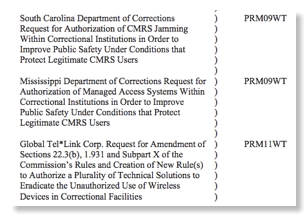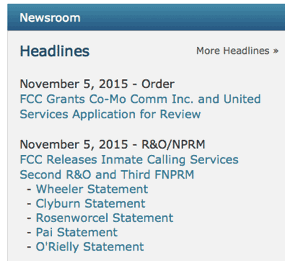Wright Case Highlights FCC's Petition Black Hole
The above snapshot of the FCC's home page today shows FCC crowing about its success in the Wright Petition case dealing with inmate call rates. While this Title II proceeding has little to do with spectrum policy it highlights the little known details about how the FCC's "petition black hole" works. The right to petition the federal government is one guaranteed by the 1st Amendment and the APA (5 U.S.C. 553(e)). FCC has implemented this requirement with 47 C.F.R. 1.401. But all this means nothing if petitions fall into an administrative black hole where they can not be seen, let alone acted on!

"These cases raise issues that are of great human concern to inmates, their family members and their counsel. . . . In referring this matter to the FCC, the Court expects the agency to move with dispatch to conclude its ongoing proceedings so as to provide both courts and parties with meaningful analysis and guidance on these issues." (Emphasis added.)
So this case was not a random petition that just wandered into the FCCs inbox, it came with the urging of a federal judge to "move with dispatch" and even then FCC frittered away years on inaction!
Petitions from techies for new spectrum rules or even waivers also can be caught in the FCC's petition back hole for years. The NPRM in Docket 13-111 on contraband cellphone use in prison accidentally gave a clue about the petition blackhole at FCC. The drafters of this NPRM had the award issue of how to deal with several petitions relating to it that had been gathering dust for years without even a request for public comments.

The drafters dealt with this awkward issue by identifying the petitioners with their index numbers in ECFS using a scheme that had never been revealed to the public and was not even widely known within FCC. So if you input into ECFS "PRM14WT" you get back a list of all petitions that were assigned to the Wireless Telecom Bureau, correctly or not, in 2014. There you will find that a petition from key industry player Land Mobile Communications Council was filed on 05/15/2014 and public comments were requested on 07/21/2014 as RM-11722 . But petitions from the more obscure Mark Friedlander and Cord Davidson remain in the FCC's black hole, nether having been dismissed nor having been put out for public comment.
So here is a concrete suggestion to address the root cause of the Wright Petition delay and delays of petitions lingering in the black hole: FCC should establish an online database of all petitions for rulemaking and waivers within a few weeks of their filing at FCC that identifies which bureau they have been assigned to (something that is sometimes in error) as well as stating what the current status of the petition is, e.g. without any action, dismissed, public notice requesting comments has been issued, NPRM issued, etc. FCC should also public statistics on time to resolve such petitions. So while today's commissioners decree the delay of the Wright Petition, let's make sure that never happened again in either technical or nontechnical proceedings at FCC.
ICYMI: @FCC takes a big step to reduce inmate calling rates. Details: https://t.co/4o2A10i58P
— The FCC (@FCC) October 27, 2015



![Validate my RSS feed [Valid RSS]](valid-rss-rogers.png)

